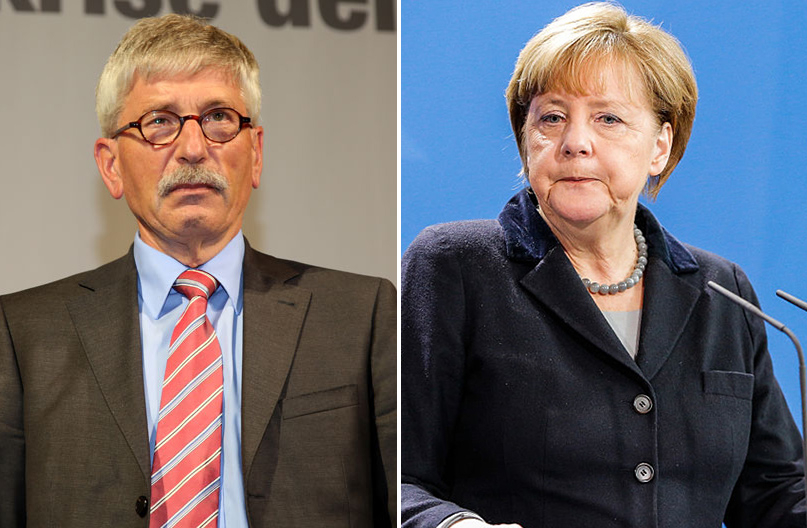Muslim asylum seekers are enforcing Islamic Sharia law in German refugee shelters, according to police, who warn that Christians, Kurds and Yazidis in the shelters are being attacked by Muslims with increasing frequency and ferocity.
Muslim migrants from different sects, clans, ethnicities and nationalities are also attacking each other. Violent brawls — sometimes involving hundreds of migrants — are now a daily occurrence.
Police say the shelters, where thousands of migrants are housed together in cramped spaces for months at a time, are seething cauldrons ready to explode. The police are urgently calling for migrants of different faiths to be housed in separate facilities.
Some politicians counter that such segregation would go against Germany’s multicultural values, while others say that separating hundreds of thousands of migrants by religion and nationality would be a logistical impossibility.
As the consequences of unrestrained migration become apparent, the tide of public opinion is turning against the government’s open-door policy. Observers say that German Chancellor Angela Merkel, the so-called most powerful woman in the world, may have met her Waterloo.
A report published by the newspaper Die Welt on September 27 sheds light on the targeting of Christians by Muslims in German refugee shelters. The paper interviewed an Iranian convert to Christianity who said:
“In Iran, the Revolutionary Guards arrested my brother in a house church. I fled from the Iranian secret service because I thought that in Germany I could finally live my faith without persecution. But in the refugee shelter, I cannot admit that I am a Christian, or I would face threats.
“Muslims wake me before the crack of dawn during Ramadan and say that I should eat before sunrise. When I decline, they call me a kuffar, an unbeliever. They spit at me. They treat me like an animal. They threaten to kill me.”
At a refugee shelter in Hemer, a town in North Rhine-Westphalia, 10 Algerian asylum seekersattacked a Christian couple from Eritrea with glass bottles. The Muslims said they were angry that the man was wearing a cross. They ripped the cross from his neck and stole his money and cellphone.
Die Welt also interviewed an Iraqi Christian family from Mosul who were living at a refugee shelter in the Bavarian town of Freising. The father said that threats by Islamists were a daily fact of life. “They shouted at my wife and hit my child,” he said. “They say: ‘We will kill you and drink your blood.'” Life in the shelter, he said, was as if in a prison.
According to the director of the Munich-based Central Committee for Oriental Christians, Simon Jacob, these incidents are only “the tip of the iceberg.” “The actual number of attacks is very high,” he said. “We have to expect further conflict, which the migrants bring to Germany from their homelands. Between Christians and Muslims. Between Shiites and Sunnis. Between Kurds and extremists. Between Yazidis and extremists.”
Max Klingberg, the director of the Frankfurt-based International Society for Human Rights (Internationale Gesellschaft für Menschenrechte, IGFM), says that much of the aggression is being perpetrated by Afghans and Pakistanis, who are “even more Islamic than some Syrians and Iraqis.” He warns that conflict in the refugee shelters will only become worse:
“We have to dispense with the illusion that all of those who are coming here are human rights activists. Among those who are arriving here now, a substantial number are at least as religiously intense as the Muslim Brotherhood.
“We are getting reports of threats of aggression, including threats of beheading, by Sunnis against Shiites, but Yazidis and Christians are the most impacted. Those Christian converts who do not hide their faith stand a 100% probability of being attacked and mobbed.”
In a September 29 interview with the newspaper Passauer Neue Presse, the head of the German police union (Deutschen Polizeigewerkschaft, DPolG), Rainer Wendt, warned that “brutal criminal structures” have taken over the refugee shelters and that police are overwhelmed and unable to guarantee safety and security. He called for Christians and Muslims to be separated before someone gets killed:
“We have been witnessing this violence for weeks and months. Groups based on ethnicity, religion or clan structures go after each other with knives and homemade weapons. When these groups fight each other at night, all those German citizens who welcomed the migrants with open arms at the Munich train station are fast asleep, but the police remain awake and are left standing in the middle…
“We can only estimate the true extent of violence because women and children are often afraid to file a complaint. Since it is also about sexual abuse and rape…
“Sunnis are fighting Shiites, there are Salafists from competing groups. They are trying to impose their rules in the shelters. Christians are being massively oppressed and the Sharia is being enforced. Women are forced to cover up. Men are forced to pray. Islamists want to introduce their values and order at the shelters.
Wendt gave the interview days after 300 Albanian migrants clashed with 70 Pakistani migrants at a refugee shelter in Calden, a town in the state of Hesse, on September 27. More than a dozen people, including three police officers, were injured in the melee, which erupted after two migrants got into a fight while waiting in line at the canteen. It took 50 police officers several hours to restore order at the shelter, which is home to 1,500 migrants from 20 different countries.
More than 60 migrants, including ten children, were injured after Pakistanis and Syriansclashed at the same shelter on September 13. The fight broke out just after midnight, when someone sprayed mace into a tent filled with sleeping migrants. Police did not inform the public about the fight for more than a week, apparently to prevent fueling anti-immigrant sentiments.
Violent brawls are becoming commonplace at German refugee shelters across the country.

In the past two months alone, dozens of violent brawls and riots between different groups of migrants have erupted in Germany’s refugee shelters.
|
On September 30, migrants went on a rampage at a refugee center in Braunschweig, a city in Lower Saxony. On September 29, Syrian migrants clashed at a refugee shelter inGerolzhofen, a small town in Bavaria. Also on September 29, migrants from Algeria and Maliclashed at a refugee center in Engelskirchen, a town in North Rhine-Westphalia.
On September 28, more than 150 Syrians and Pakistanis clashed at a refugee shelter on Nöthnitzer Straße in Dresden. The migrants attacked each other with wooden planks and metal bars. Two dozen police officers were needed to restore order. More than 30 Syrians and Pakistanis clashed at the same shelter on August 10.
Also on September 28, between 100 and 150 migrants of different nationalities clashed at a refugee shelter in Donaueschingen, a town in the Black Forest. The trouble started over a dispute about who should be able to use the shower facilities first. On September 22, more than 400 migrants marched through town to protest conditions at the same facility. On September 15, a male migrant was attacked by another migrant for using a female bathroom at the shelter.
On September 24, around 100 Syrians and Afghans clashed at a refugee shelter in Leipzig, the largest city in Saxony. The fight broke out after a 17-year-old Afghan pulled a knife on an 11-year-old Syrian girl at the shelter, which houses 1,800 migrants. On September 23, migrants clashed at a refugee shelter for unaccompanied minors in Nuremberg.
On September 3, Syrian migrants attacked security guards at a refugee shelter in the Moabit district of Berlin. Also on September 3, Iraqi migrants attacked security guards at a refugee shelter in Heidelberg. A total of 21 squad cars were dispatched to restore order. On September 2, Algerian and Tunisian migrants clashed at the same shelter. A dozen police cars were deployed to restore order.
On September 3, migrants clashed at a refugee shelter in Hövelhof, a town in North Rhine-Westphalia. On September 2, migrants clashed at a refugee facility in Wolgast, a town in Mecklenburg-Vorpommern. Also on September 2, migrants clashed at a refugee center inGütersloh, a town in North Rhine-Westphalia.
On September 1, migrants clashed at a refugee shelter in Delitzsch, a town in Saxony. A 27-year-old Tunisian migrant was killed after being stabbed by a 27-year-old migrant from Morocco. Also on September 1, a 15-year-old Somali migrant stabbed a 15-year-old Egyptian migrant with a scissors at a refugee center in the Groß Borstel district of Hamburg.
On September 1, Somali, Syrian and Albanian migrants clashed at a refugee center inTegernsee, a small town in Bavaria. Also on September 1, migrants clashed at a refugee shelter in Heidelberg.
On August 31, Libyan and Tunisian migrants clashed at a refugee shelter in Hoyerswerda, a town in Saxony. Also on August 31, migrants clashed with each other and with security guards at a refugee shelter in Heidelberg. On August 30, a 25-year-old Sudanese migrant was arrested for going on a rampage at a refugee shelter in Jesteburg, a small town in Lower Saxony.
On August 29, a 17-year-old Algerian migrant was arrested for robbing the cellphones of other migrants at a refugee center in Elzach, a town in Baden-Württemberg. On August 25, 60 migrants went on a rampage at a refugee shelter in Karlsruhe.
On August 24, a migrant from Montenegro was stabbed by a migrant from Algeria at a refugee shelter in Seevetal, a town in Lower Saxony.
On August 22, Afghan migrants clashed at a refugee shelter in Rotenburg, a town in Hesse. Also on August 22, at least 20 migrants went on a rampage at a refugee center in Grafing, a town near Munich.
On August 21, migrants clashed at a refugee facility in Schwetzingen, also in Baden-Württemberg. Also on August 21, migrants clashed at a refugee center in the Marienthal district of Hamburg.
On August 16, 50 migrants attacked each other with broken tree branches, umbrellas and trash cans at a refugee center in Friedland, a town in Lower Saxony. The facility, which has a capacity of 700, is home to 2,400 migrants.
On August 19, at least 20 Syrian migrants staying at an overcrowded refugee shelter in the eastern German town of Suhl tried to lynch an Afghan migrant after he tore pages from a Koran and threw them in a toilet. More than 100 police officers intervened; they were attacked with stones and concrete blocks. Seventeen people were injured in the melee, including 11 refugees and six police officers. The Afghan is now under police protection. The president of the German state of Thuringia, Bodo Ramelow, said that to avoid similar violence in the future, Muslims of different nationalities must be separated.
On August 10, 40 migrants clashed at a refugee shelter on Bremer Straße in Dresden.
On August 1, 50 Syrians and Afghans clashed at the same shelter. More than 80 police officers were needed to restore order.
According to Jörg Radek, the vice chairman of Germany’s police union, (Gewerkschaft der Polizei, GdP), police have reached the “absolute breaking point,” and Christian and Muslim migrants should be housed separately. In a September 28 interview with the newspaper Die Welt, Radek said:
“Our officers are increasingly being called to respond to confrontations in refugee shelters. When there are 4,000 people in a shelter which only has space for 750, this leads to aggression where even something as insignificant as a walk to the restroom can lead to fisticuffs.
“We must do everything we can to prevent further outbreaks of violence. I think it makes perfect sense to separate migrants according to their religion.”
Not everyone agrees. In an interview with N24 television, the former mayor of the Neukölln district of Berlin, Heinz Buschkowsky, warned that if migrants are separated by religion and nationality, Germany risks the permanent establishment of parallel societies throughout the country.
Buschkowsky said the first lesson migrants must learn when they arrive in Western countries is tolerance, and if they refuse to accept people of other faiths, their asylum applications should be rejected. He expressed pessimism about the possibility of integrating the current wave of migrants into German society: “The bulk of the migrants who are arriving here cannot be integrated.”
Meanwhile, the head of German intelligence, Hans-Georg Maaßen, was warned that radical Muslims in Germany are canvassing the refugee shelters looking for new recruits. He said:
“Many of the asylum seekers have a Sunni religious background. In Germany there is a Salafist scene that sees this as a breeding ground. We are observing that Salafists are appearing at the shelters disguised as volunteers and helpers, deliberately seeking contact with refugees to invite them to their mosques to recruit them to their cause.”
The editor of the newspaper Neue Westfälische, Ansgar Mönter, reports that Salafists in Bielefeld, a city in North Rhine-Westphalia, have already infiltrated refugee centers in the area by bringing toys, fruits and vegetables for the migrants.
Mönter says “naïve” politicians are contributing to the radicalization of refugees by are asking Muslim umbrella groups in the country to reach out to the migrants.
Mönter points out that the main Muslim groups in Germany all adhere to fundamentalist interpretations of Islam and are anti-Western in outlook. Some groups have ties to the Muslim Brotherhood while others want to implement Sharia law in Germany. According to Mönter, politicians should not be encouraging these groups to establish contact with the new migrants.



































